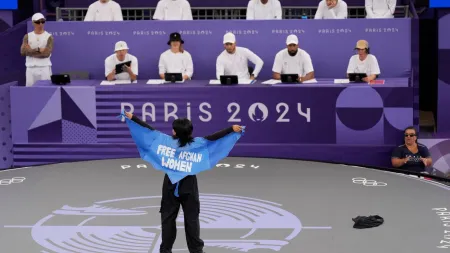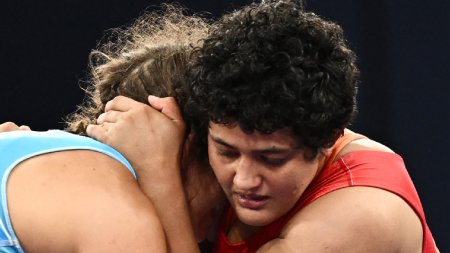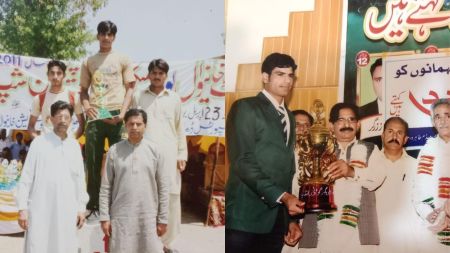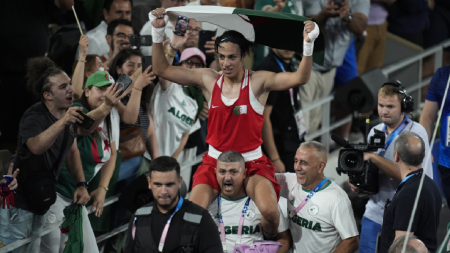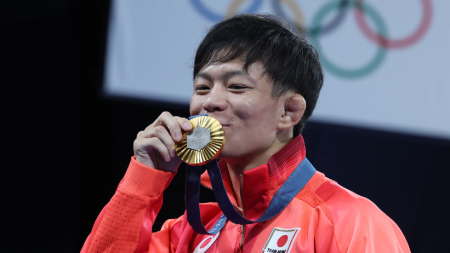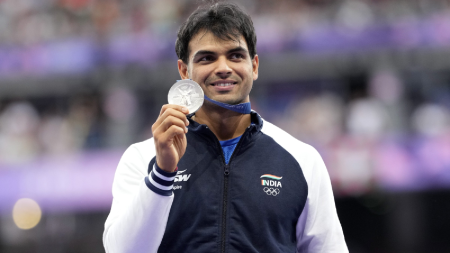Who is perched on the Throne of Games? Not US, not China, but NCCA, the American college sporting system, that has produced most gold-winning athletes
As Julien Alfred burnt the purple Parisian track with her 100m dash that left the favourite Sha’Carri Richardson in her wake, it was a case of an American athlete beaten by a product of the American system.
The 23-year-old broke St Lucia’s duck, winning the first-ever Olympic medal — gold, no less — for a country with a population of less than 2 lakh. One of the many medals at the Olympics that wasn’t won by an American, but was made in America.

Alfred trains and competes in the National Collegiate Athletics Association (NCAA), regarded as the biggest, most competitive sports structure in the world. And she isn’t the only beneficiary of the system who has sparkled in Paris.
The swimmer Leon Marchand studied in America, coached by an American, benefitted by the American methods and lived in America. During his country, France’s, big moment, the quadruple gold medal winner made a splash so big that it left the Americans hurting as they returned with their worst swimming haul since the 1956 Olympics.
On the land, and in the water, the US have been challenged like never before at the Paris Olympics. Interestingly, in many cases, it is the athletes produced by the NCAA or coached by Americans that have tested them the most.
Not just the medallists, even those who did not finish on the podium could make it as far as Paris because of the year-round competitive system. “It has helped me perform under pressure and hit my routines in competition,” says Emma Malabuyo, the Philippines gymnast.
If the NCAA were a country, it would have won the battle for the most number of gold medals by a margin bigger than the yawning distances Usain Bolt had while crossing the finish line.
With 60 medals as of Saturday afternoon, the unrivalled sporting system in the world had nearly as much gold as the two biggest Olympic powerhouses, China (34) and the USA (33).
This isn’t even the most eye-catching stat. The US isn’t the only country that has benefited from its college system. NCAA athletes from 11 other nations — from the tiny Caribbean islands of Jamaica, St Lucia and Dominica to giants like Australia, Canada and Britain — also have gone on to stand on the top of the podium here.
Divided by flags, these athletes — and thousands of others — are united by the NCAA. As much as grooming their athletes, the body that regulates college sports in the United States and Canada has played a direct role in converting sportspersons from other nations into champions.
There are more than 1,200 former and current NCAA students, who study in one of the 251 colleges, across 125 countries at the Paris Olympics, according to the organisation.
With 406 athletes, the maximum representation is in track and field followed by swimming (223) and basketball (150). Among countries, other than the US and Canada who naturally have high NCAA students in their teams, Australia (44), Nigeria (38) and Jamaica and Germany (34 each) are the nations with maximum athletes who study, train and compete in American colleges.
“(In the NCAA, we) compete every single weekend for the team, which helps me deal (better) with the mental aspect (of competition). It brought out my personality, I feel very confident,” Malabuyo said.
The American expertise goes beyond just college sports. The Olympic powerhouse is also exporting coaches. They are producing players who, in turn, are challenging the American dominance. Like Marchand.
Marchand emerged as the face of these Games, sweeping gold medals in the 400m individual medley, the 200m butterfly and breaststroke — on the same night, and the 200m medley on Friday. He clocked Olympic record times in every race he won. And none of it would have been possible without the coach who is also responsible for giving the world Michael Phelps — Bob Bowman.
Bowman was a coach at Arizona State University when Marchand, aged 18, wrote him a letter, seeking a scholarship that would allow him to ‘compete in NCAA with your amazing team’.
Bowman, a former US National Swim team coach, joined hands with the Frenchman. It wasn’t the first time he was coaching an athlete from another country. In a nation with a proud swimming record, Bowman helping swimmers from other countries triggered an ‘ethical issue’.
“Almost every one of the coaches on this deck is involved with more than one country’s swimmers. It’s ethically okay to me,” Bowman told the website swimswam.com in April.
Marchand wasn’t the only swimmer Bowman produced. Hungary’s Hubert Kos paid rich tributes to the legendary coach after he won the 200m backstroke gold medal. Kos, like Marchand, is a product of the NCAA.
“I obviously wouldn’t be here today with a gold medal around my neck if I hadn’t gone out to train under Bob. I probably still wouldn’t even be swimming backstroke if it wasn’t for him,” Kos said. “My mental strategies, my confidence going into races, into competitions, knowing what to do, knowing when to do it, trusting the process… that’s obviously all thanks to Bob and the NCAA system.”
Bowman’s two students won more medals than the 46-member US swim team. And that has contributed to a spicy end to the Games, with China — for the first time — having a chance to pip the US in the gold medal count.
The race to finish first in the medal standings may end up being a photo finish. There is, however, one clear-cut gold standard: the American college sports system.
Number of gold medallists: 60 (as of Saturday afternoon)
Number of athletes in Olympics: More than 1,200
Number of countries with NCAA athletes: 125
Number of countries for whom NCAA athletes won gold: 12
Disclaimer: The copyright of this article belongs to the original author. Reposting this article is solely for the purpose of information dissemination and does not constitute any investment advice. If there is any infringement, please contact us immediately. We will make corrections or deletions as necessary. Thank you.
